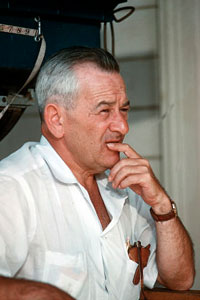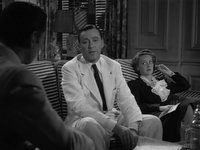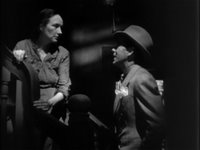 The Siren is delighted to see that the comments section for her post on Dodsworth has become a little love-in for the great William Wyler. The director occupies an odd spot in the cinephile pantheon. You wouldn't call him underrated, since his filmography makes him impossible to ignore. Yet somehow he doesn't get the same quality of attention as other directors of equal or even much lesser stature. Compare the wan little entry on Wyler in Wikipedia with the Hitchcock and Spielberg entries and you start to see what I mean.
The Siren is delighted to see that the comments section for her post on Dodsworth has become a little love-in for the great William Wyler. The director occupies an odd spot in the cinephile pantheon. You wouldn't call him underrated, since his filmography makes him impossible to ignore. Yet somehow he doesn't get the same quality of attention as other directors of equal or even much lesser stature. Compare the wan little entry on Wyler in Wikipedia with the Hitchcock and Spielberg entries and you start to see what I mean. He does consistently get his due when it comes to performances. His actors knew what they had with Wyler, even if his take-after-take style left their nerves shattered. Gentle Audrey Hepburn got her head bitten off by the director on the set of Roman Holiday when she couldn't cry on camera. The astonished Hepburn burst into tears, Wyler got his take and Hepburn, of course, later got her only Oscar. Ruth Chatterton, as noted, ended by hating Wyler's guts, but she lived long enough to see Dodsworth alone of all her movies retain its fame with the general public. "I would have jumped into the Hudson River if he told me to," said Bette Davis, who fell passionately in love with her director during the filming of Jezebel. Her second film with Wyler, The Letter, is the Siren's pick for the most subtle and penetrating performance she ever gave in a career filled with great roles. (According to Whitney Stine, Davis also liked to tell how costar Herbert Marshall managed to irritate "90-Take Willie" no end by just repeating "I'd be happy to do it again, Mr. Wyler," in that sterling-silver accent of his.)
He does consistently get his due when it comes to performances. His actors knew what they had with Wyler, even if his take-after-take style left their nerves shattered. Gentle Audrey Hepburn got her head bitten off by the director on the set of Roman Holiday when she couldn't cry on camera. The astonished Hepburn burst into tears, Wyler got his take and Hepburn, of course, later got her only Oscar. Ruth Chatterton, as noted, ended by hating Wyler's guts, but she lived long enough to see Dodsworth alone of all her movies retain its fame with the general public. "I would have jumped into the Hudson River if he told me to," said Bette Davis, who fell passionately in love with her director during the filming of Jezebel. Her second film with Wyler, The Letter, is the Siren's pick for the most subtle and penetrating performance she ever gave in a career filled with great roles. (According to Whitney Stine, Davis also liked to tell how costar Herbert Marshall managed to irritate "90-Take Willie" no end by just repeating "I'd be happy to do it again, Mr. Wyler," in that sterling-silver accent of his.) Less frequently mentioned, but to the Siren's mind just as important, is Wyler's phenomenal ability to give his movies a sense of time and space. From the slum that abuts a luxury high-rise in Dead End, to the still, airless elegance of Washington Square in The Heiress, to an under-patronized bar in The Best Years of Our Lives, you enter the picture's world with total intensity and intimacy. So his actors aren't giving their all against a fantasy background you're either enjoying immensely or trying to ignore, as with Michael Curtiz; nor do they have to compete with an immutable set of scenic preconceptions, as they do with Hitchcock. In Wyler's best pictures--and the Siren thinks most of them are very good indeed--the players seem wholly truthful and in tune with the setting, no matter how epic or how small.
Less frequently mentioned, but to the Siren's mind just as important, is Wyler's phenomenal ability to give his movies a sense of time and space. From the slum that abuts a luxury high-rise in Dead End, to the still, airless elegance of Washington Square in The Heiress, to an under-patronized bar in The Best Years of Our Lives, you enter the picture's world with total intensity and intimacy. So his actors aren't giving their all against a fantasy background you're either enjoying immensely or trying to ignore, as with Michael Curtiz; nor do they have to compete with an immutable set of scenic preconceptions, as they do with Hitchcock. In Wyler's best pictures--and the Siren thinks most of them are very good indeed--the players seem wholly truthful and in tune with the setting, no matter how epic or how small.This Sunday, for her fellow Wyler lovers, the Siren is linking to two marvelous Wyler tributes. This one by David Cairns is on the indispensable Senses of Cinema site, and this one is by Josh Becker. Both men are directors, and that can't be a coincidence.
Không có nhận xét nào:
Đăng nhận xét